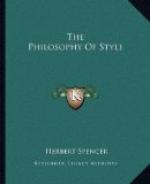25. By making this change, some of the suspensions are avoided and others shortened; while there is less liability to produce premature conceptions. The passage quoted below from ‘Paradise Lost’ affords a fine instance of a sentence well arranged; alike in the priority of the subordinate members, in the avoidance of long and numerous suspensions, and in the correspondence between the order of the clauses and the sequence of the phenomena described, which, by the way, is a further prerequisite to easy comprehension, and therefore to effect.
“As when a prowling
wolf,
Whom hunger drives to
seek new haunt for prey,
Watching where shepherds
pen their flocks at eye,
In hurdled cotes amid
the field secure,
Leaps o’er the
fence with ease into the fold;
Or as a thief, bent
to unhoard the cash
Of some rich burgher,
whose substantial doors,
Cross-barr’d,
and bolted fast, fear no assault,
In at the window climbs,
or o’er the tiles;
So clomb this first
grand thief into God’s fold;
So since into his church
lewd hirelings climb.”
26. The habitual use of sentences in which all or most of the descriptive and limiting elements precede those described and limited, gives rise to what is called the inverted style: a title which is, however, by no means confined to this structure, but is often used where the order of the words is simply unusual. A more appropriate title would be the direct style, as contrasted with the other, or indirect style: the peculiarity of the one being, that it conveys each thought into the mind step by step with little liability to error; and of the other, that it gets the right thought conceived by a series of approximations.
27. The superiority of the direct over the indirect form of sentence, implied by the several conclusions that have been drawn, must not, however, be affirmed without reservation. Though, up to a certain point, it is well for the qualifying clauses of a period to precede those qualified; yet, as carrying forward each qualifying clause costs some mental effort, it follows that when the number of them and the time they are carried become great, we reach a limit beyond which more is lost than is gained. Other things equal, the arrangement should be such that no concrete image shall be suggested until the materials out of which it is to be made have been presented. And yet, as lately pointed out, other things equal, the fewer the materials to be held at once, and the shorter the distance they have to be borne, the better. Hence in some cases it becomes a question whether most mental effort will be entailed by the many and long suspensions, or by the correction of successive misconceptions.




